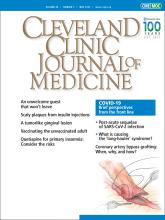ABSTRACT
The second-generation antipsychotic drug quetiapine (Seroquel) is increasingly being used off-label for treating insomnia in the general population, possibly to avoid standard medications with known addictive qualities and adverse side effects. However, evidence to support using it in this way is scant, and quetiapine is associated with weight gain and other metabolic effects. It must be used cautiously and with appropriate monitoring for adverse effects and abuse.
- Copyright © 2021 The Cleveland Clinic Foundation. All Rights Reserved.
- Vania Modesto-Lowe, MD, MPH⇑
- University of Connecticut School of Medicine, Farmington, CT; Quinnipiac University, Hamden, CT; Connecticut Valley Hospital, Middletown, CT
- Address:
Vania Modesto-Lowe, MD, MPH, Connecticut Valley Hospital, PO Box 351, Silver Street, Middletown, CT 06457; vania.modesto-lowe{at}ct.gov
- Agata K. Harabasz, MD
ABSTRACT
The second-generation antipsychotic drug quetiapine (Seroquel) is increasingly being used off-label for treating insomnia in the general population, possibly to avoid standard medications with known addictive qualities and adverse side effects. However, evidence to support using it in this way is scant, and quetiapine is associated with weight gain and other metabolic effects. It must be used cautiously and with appropriate monitoring for adverse effects and abuse.
- Copyright © 2021 The Cleveland Clinic Foundation. All Rights Reserved.






